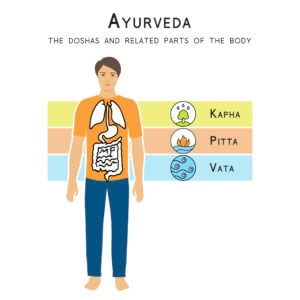The Science of Ayurveda and Its Impact on Personal Wellness
The Science of Ayurveda and Its Impact on Personal Wellness
Blog Article
Introducing the Surprising Benefits of Ayurveda That Everybody Need To Know
Ayurveda, an ancient system of medicine rooted in Indian approach, provides a diverse approach to health and wellness that prolongs beyond simple physical well-being. By concentrating on the complex equilibrium between mind, spirit, and body, this alternative practice discloses unexpected benefits that many might neglect. From enhancing digestion health to nurturing emotional equilibrium, Ayurveda's tailored therapies deal with private needs. Yet, the deepness of its influence on resistance and mental quality may amaze also one of the most health-conscious individuals. Comprehending these principles could change one's perspective on wellness, motivating a closer assessment of this time-honored practice.
Recognizing Ayurveda Principles
Ayurveda, often referred to as the "science of life," is an all natural system of medicine that stemmed in old India over 3,000 years ago. Central to Ayurveda are the concepts of the 3 doshas-- Vata, Pitta, and Kapha-- which represent various combinations of the 5 components: planet, water, fire, ether, and air.
Ayurveda additionally worries the importance of preventative treatment and self-awareness, motivating people to grow a deeper understanding of their minds and bodies. By incorporating these concepts, Ayurveda seeks to equip people to achieve optimum wellness and preserve balance throughout their lives, making it a classic resource for all natural healing.
Enhancing Digestive Health And Wellness
Digestion health is a cornerstone of general health in Ayurveda, as it directly influences the body's capacity to take in nutrients and remove waste. Central to Ayurveda's strategy to digestion is the concept of "Agni," or digestive fire, which is vital for transforming food into energy. A well balanced Agni makes certain not only optimum digestion but likewise stops the accumulation of toxic substances, referred to as "ama," which can lead to numerous health problems.
Ayurvedic experts emphasize customized nutritional recommendations tailored to one's dosha-- Vata, Pitta, or Kapha. Each dosha has particular dietary requirements and choices that can boost digestive effectiveness. Warm, cooked foods are often advised for Vata types to support their irregular food digestion, while Pitta individuals may benefit from cooling foods to soothe their intense gastrointestinal processes.
Including herbs such as fennel, ginger, and cumin can further strengthen digestive health. These natural herbs not only boost Agni however also relieve typical digestive system problems like bloating and gas. Furthermore, techniques such as conscious consuming and correct dish timings are important for cultivating an unified gastrointestinal setting, eventually bring about enhanced nutrient absorption and vitality.
Boosting Resistance Normally
Immunity works as the body's defense reaction against infections and diseases, making its enhancement an essential aspect of alternative wellness. Ayurveda supplies a wide range of all-natural solutions and practices aimed at increasing immunity via a balanced way of life. Central to this method is the idea of "Ojas," which stands for the significance of vigor and strength.
Ayurvedic texts stress the importance of beneficial foods such as fresh fruits, vegetables, entire grains, and seasonings like turmeric and ginger. These components are abundant in antioxidants and anti-inflammatory properties, crucial for improving the immune action. Including adaptogenic natural herbs like Ashwagandha and Tulsi can likewise aid the body adapt to stress and anxiety and strengthen immune feature.
In addition, an everyday regimen that consists of ample rest, normal physical task, and mindfulness methods such as yoga exercise and meditation plays a critical function in preserving a robust immune system. By balancing the body's doshas-- Vata, Pitta, and Kapha-- Ayurveda advertises a balanced internal setting that can properly prevent ailments.
Supporting Mental Clearness
A well-functioning mind is important to total health, closely connected to the body's physical state, including its immune system. Ayurveda stresses the importance of mental clearness as a keystone of well-being, using different methods and concepts to improve cognitive why not look here function. Ayurveda. The Ayurvedic point of view identifies 3 key doshas-- Vata, Pitta, and Kapha-- which regulate psychological processes. Comprehending one's dosha can give understandings right into customized methods for boosting focus and mental skill.
Including practices such as meditation, yoga exercise, and mindfulness can considerably increase psychological clarity. These techniques not only lower stress and anxiety and anxiousness however also cultivate a state of recognition that enhances cognitive abilities.
In addition, preserving a balanced lifestyle that consists of ample rest, normal exercise, and social connections adds to psychological quality. By taking on these holistic techniques, people can grow sharper focus, boosted decision-making, and a better feeling of mental wellness, eventually bring about an extra satisfying life.
Attaining Emotional Equilibrium

Psychological balance is vital for overall well-being, influencing not only mental health however also physical vigor. Ayurveda uses an all natural technique to achieving this balance by recognizing the interconnectedness of the body, mind, and spirit. Central to Ayurvedic ideology is the idea of doshas-- Vata, Pitta, and Kapha-- which stand for different energies within the body. Discrepancies in these doshas can cause psychological instability, showing up as stress and anxiety, impatience, or depression.
To recover psychological equilibrium, Ayurveda stresses customized lifestyle modifications, including dietary modifications, herbal remedies, and mindfulness methods. Incorporating relaxing foods, such as cozy soups and sweet fruits, can calm Vata, while grounding and nourishing techniques can soothe Pitta's intensity. Additionally, including yoga exercise and reflection can cultivate psychological resilience by promoting self-awareness and decreasing anxiety.

Conclusion
In summary, Ayurveda supplies an alternative approach to health that includes the detailed equilibrium of spirit, mind, and body. Its principles help with enhanced digestive system health and wellness, normally strengthen resistance, and advertise mental clarity while promoting psychological security. By integrating tailored treatments based upon specific dosha types, Ayurveda presents a comprehensive system for achieving optimum wellness. Embracing these old practices can result in considerable renovations in general health and vitality, underscoring the importance of Ayurveda in modern health techniques.
From boosting gastrointestinal wellness to nurturing psychological balance, Ayurveda's tailored treatments provide to private needs. Ayurveda. By incorporating these principles, Ayurveda seeks to empower people to attain optimum wellness and maintain equilibrium throughout their lives, making it a classic resource for holistic healing

Report this page